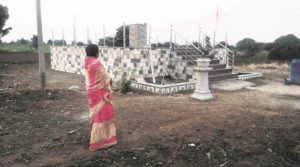Two tales of two very different murder trials, a Dalit and a Maratha
 Ahmednagar: A local court in Ahmednagar, Maharashtra, is expected to announce today the quantum of sentence to three people convicted of the rape and murder of a 14-year-old girl in Kopardi village last year. The developments in the case have been keenly followed, but the final outcome today has assumed even greater significance in view of what happened in a neighbouring courtroom in the same Ahmednagar court premises only last week.
Ahmednagar: A local court in Ahmednagar, Maharashtra, is expected to announce today the quantum of sentence to three people convicted of the rape and murder of a 14-year-old girl in Kopardi village last year. The developments in the case have been keenly followed, but the final outcome today has assumed even greater significance in view of what happened in a neighbouring courtroom in the same Ahmednagar court premises only last week.
On November 23, that neighbouring courtroom had acquitted all nine accused persons charged with the murder of 17-year-old Dalit student Nitin Agey, in 2014. Agey was killed in broad daylight in Kharda village of Jamkhed taluka of Ahmednagar district and his dead body was hanged from a tree, allegedly by men from the upper caste Maratha community, who suspected him of having a love affair with a girl related to them.
Cops had arrested ten people, including the girl’s brother Sachin Golekar and uncle Sheshrao Yeole, on charges of murder and sections of SC/ST Prevention of Atrocities Act. While one accused died during the trial, all the other nine had to be acquitted last week for lack of evidence, as 16 of the 26 witnesses, including the staff and teachers of the school where Nitin Agey was attacked, turned hostile.
In the Kopardi rape and murder case, the caste equation is poised in exactly the opposite manner. Here, the victim was a Maratha girl and all the convicts happen to be Dalit.
But Kopardi is just one in a series of high-profile incidents in Ahmednagar itself in the last couple of years that have seen clashes between the Dalit community and the upper castes.
Before the Kharda killing of Nitin Agey, the murder of three persons of a Dalit family in Sonai village in Ahmednagar in January 2013, allegedly by men from the upper castes, had sent shock waves. A mob had allegedly chopped the trio in pieces suspecting one of them of having a love affair with a girl from their community.
Then, in October 2014, three members of a Dalit family at Javkheda village in Ahmednagar were found murdered. A police probe revealed it was not a caste atrocity. Cops arrested two relatives of the victim, who allegedly committed murders following an internal dispute.
But, by the time case was solved, protests were staged across the state on the suspicion that upper caste people had killed the trio in Javkheda. Dalit activists even raised a demand of declaring Ahmednagar a “Jatiya Atyachargrasta jilha (District affected with caste atrocities)” following the Javkheda incident.
Adding to the unrest was the murder of Dalit youth Sagar Shejwal in Shirdi in Ahmednagar in May 2015. Cops claim it was not a caste atrocity. But many activists believe Sagar was killed by persons from dominant castes, for keeping a pro-Ambedkar song as a ringtone on his phone.
It is in this backdrop that the rape and murder of the 14-year-old girl in Kopardi village in Ahmednagar on July 13, 2016, should be viewed. Three of those arrested in this case turned out to be Dalits. The Kopardi incident had sparked massive protests, with lakhs of Marathas hitting the streets across all districts in Maharashtra. Some of their key demands included the death penalty for the accused, reservation for Marathas as well as amendments in the SC/ST Prevention of Atrocities Act. They claimed the law was being misused by Dalits for filing false cases.
In the Nitin Aage case, the demand for appointment of a special public prosecutor (SPP) and a fast track trial was never considered by the state. But in the Kopardi case, senior lawyer Ujjwal Nikam – a household name after his prosecution of Ajmal Kasab — was appointed SPP.
The kind of security arrangements in Ahmednagar court during the trial of the Kopardi case indicated the kind of pressure that was being mounted on the police and the administration. Large numbers of Maratha agitators gathered in the court premises during every hearing. Two attacks on the accused took place.
On November 18, the conviction order was announced over loud speakers for the benefit of hundreds of activists from different places who had gathered in court. On November 22, advocate Nikam sought the death penalty for the three accused. Today, the court is likely to announce the quantum of punishment.
As for the Nitin Aagey murder case, which was going on in a nearby courtroom in the same court premises, hardly as much attention has been paid. Rallies and agitations to condemn the Kharda killing took place initially, but when the key witnesses turned hostile, one by one, there was no outrage demanding justice for victims. Not many, including the then police officer who investigated Kharda killing incident, were even aware of the date on which the court passed its judgement, acquitting all the accused.
The Dalits are not protesting the verdict in the Kopardi case. But with the acquittal in the Khadra case coming around same time, they have started questioning the “fast delivery of justice” followed by “massive public support” in the Kopardi crime, comparing it with alleged “slow trials and neglect” in Dalit cases.
Not surprisingly, the local authorities in Ahmednagar have stepped up vigil ahead of the sentencing in the Kopardi case today.
Source: The Indian Express





